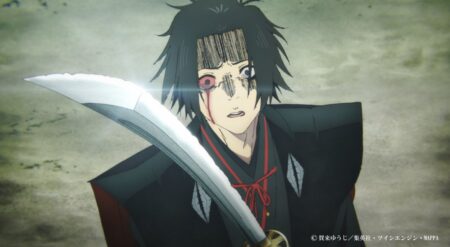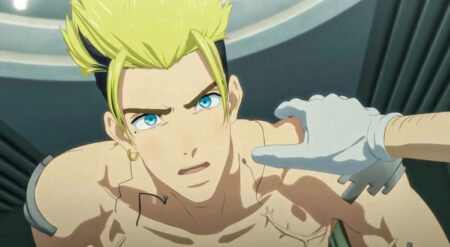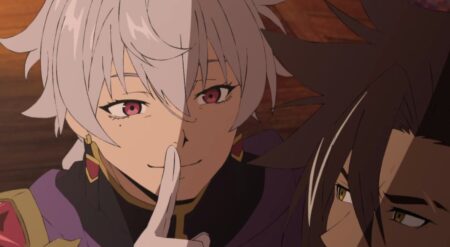There’s a lot about Leviathan that works on a technical level. Produced by studio Orange and based on the novel of the same name by Scott Westerfeld, the world depicted is vast and immersive, aided by lush visuals and, in particular, a rich score that envelops us into this particular narrative realm. However, despite the expansive universe and the way in which the source material is expanded upon, the series fails to truly stick the landing.
As has been the case with its previous productions, such as Land of the Lustrous, Beastars, and Trigun Stampede, the artistry of Leviathan (2025) is phenomenal. How the series captures the minutia of the human expression is masterful. While the 3D style of animation and directing, the series distinguishes itself against its contemporaries. If not another Orange production, there’s simply no other show that looks like this one.
Leviathan (2025) reimagines World War I through a fantasy lens. Set in 1914, the series takes place on the eve of war as a fugitive prince and a girl disguising herself as a man meet aboard a bioengineered airship, the HMS Leviathan. It tracks how their friendship would change their trajectories as they learn how to trust one another and what their developing bond means to those around them and their individual agendas.
Deryn/Dylan Sharp makes for a fantastic anime protagonist.

Wartime seen through the eyes of innocents isn’t new, yet Leviathan (2025) still manages to find fresh perspectives through its protagonists and the setting. Deryn/Dylan Sharp (Natsumi Fujiwara) is a plucky, spirited protagonist. Disguising herself as a boy so that she can enlist, her competence and sense of adventure give us a genuinely fascinating pull into the world. Our first introduction to her, as she accidentally takes flight with one of the many bio-engineered creatures used as aircraft, is winsome, sweeping us off our feet just as she becomes airborne.
Unfortunately, not both halves of the story are treated equally. It’s another moment where, in theory, Aleksandar ‘Alek’ von Hohenberg (Ayumu Murase) works as a character. We meet him just as his parents have been assassinated, leaving him in a desperately precarious situation as he’s smuggled out of his home and forced on the run by his handlers to keep his direct line to the throne safe.
There’s vague interest in Alek’s storyline, primarily due to his interactions with Dylan and his slow development. Keyword slow. The writing clearly sees him as hopeful, yet naive, and perhaps younger viewers will see his actions as purely heroic.
But there are moments when you see him walk straight into danger or refuse to help, only to ask for the wisdom of others and wonder why. Because while we can see how and why he made his decisions, the writing fails to keep it cohesive or in character.
The dynamic between Dylan and Alek gives Leviathan its only sense of heart.

But despite the shallow characterization, the dynamic between Dylan and Alek still works. And it helps flesh out the world around them as both help build a bridge between them while tensions rise in their respective countries. Alek comes from the world of The Clankers, countries that use high-tech machines such as the Walkers to fight battles and move around. Meanwhile, Dylan is fighting for the Darwinists, who instead use the bio-engineered creatures like the airbeast, the Leviathan, a giant airborne sky-whale.
That said, it’s not enough to completely anchor the story, which, for all that it’s trying to accomplish, is rendered thin. Leviathan (2025), for all of its visual spectacle and grandiose production, lacks a lot of heart. It has such a promising start with an engaging and fast-paced premiere, but it loses steam almost immediately.
The series simply doesn’t possess the right energy or sense of stakes to push the narrative forward in an interesting way. From the major, overarching conflicts to the more personal ones, things get lost along the way due to a poorly structured narrative.
It’s a shame that it doesn’t take more from its apparent influence, the many wonderful works of Studio Ghibli. Beyond the opening theme being composed by Ghibli regular, composer Joe Hisaishi, the series finds little touchstones reminiscent of some of the studio’s most constant thematic notes. From its interest in tech and machinery, especially in wartime, to the massive scale of how these otherworldly beasts are designed, the influence is apparent.
Netflix and Studio Orange delivers a visual spectacle with a story that can’t reach those heights.

And it’s even there in how the two leads are two kids out of their depth yet determined as they face a world asking too much of them, their adolescence weaponized. But again, it simply lacks the necessary soul and narrative push to make it land. The burgeoning romance at the center has its moments and sparks, but it can’t carry the entire 12-episode series.
Orange delivers superb, large-scale visuals as we take in the fantastic beasts and militant machinery that roam the world. Anything airborne is truly spectacular, and there’s clear care in the rendering of the Leviathan that highlights its scale. A shot of it bleeding and plummeting through the sky beautifully captures the best of the series. The smaller character animation is sublime too, with Dylan’s facial expressions in particular adding to her character’s immense charm.
Leviathan (2025) has so much promise, but it can’t ever fully manage to be completely engaging. We care about Dylan and Alek on a surface level. While the series touts an epic-scale, expansive world to build a story around, the story itself can never reach those same, bombastic heights. It’s pretty to look at, but a bit of a bore.
Leviathan (2025) is out now on Netflix.
Leviathan (2025)
-
Rating - 6/106/10
TL;DR
Leviathan (2025) has so much promise but can’t ever fully manage to be completely engaging. It’s pretty to look at, but a bit of a bore.







